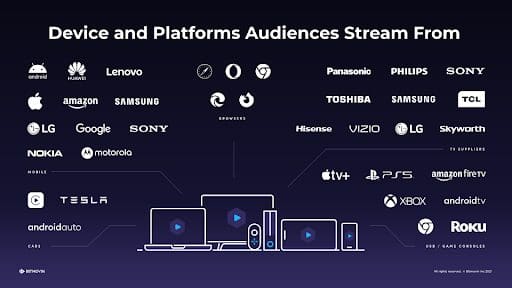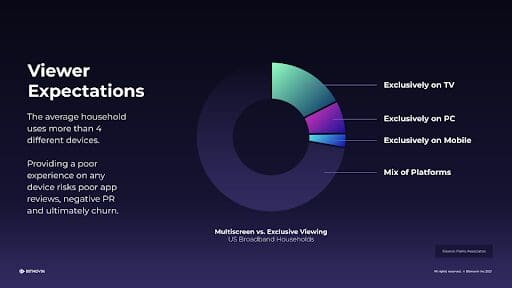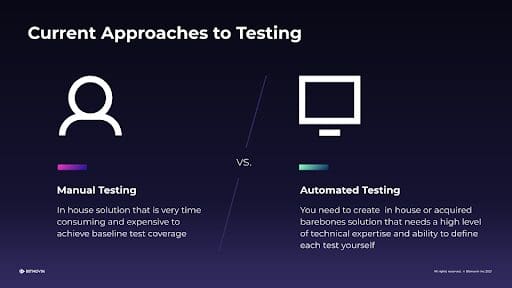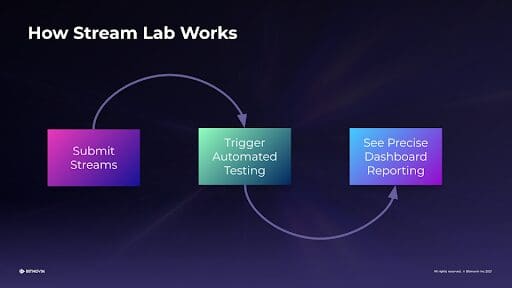Launching & managing a streaming service in today’s market can be a bit overwhelming, but it’s not for the reasons around the workflow that you’d normally think about. It’s actually about the number of devices you and your team have the capability of supporting. Audience reach is essential for any business and one major piece that is often overlooked is the difficulty around testing, supporting, and maintaining those devices to guarantee that you’re delivering the highest quality of experience with a Player on all of your supported platforms. This is an all too common occurrence in the industry and one we’ll address in this blog by going into:
- The current state of streaming device fragmentation
- The two stream testing methods that are available for companies
- What Bitmovin is doing to make developers’ lives easier
- How you and your team can support more devices with less effort
Addressing Streaming Device Fragmentation
How many devices do I need to support for my streams?
The devices on the market that audiences are using to stream content are growing rapidly, especially when you account for older models and new ones arriving on the market. Streaming Device makers don’t show any signs of slowing down and are continuously upgrading or introducing new products for users to take advantage of, which can affect the streaming services trying to engage viewer segments. Here is a quick snapshot of just the major devices and platforms viewers stream from:

The current Landscape of Streaming Device Fragmentation
From phones, browsers, and TV suppliers to cars, USB devices, and game consoles, the ever-expanding device growth seems to have no end, and it’s becoming the norm.
Showing the strain it is taking on the streaming industry, another great example of streaming device fragmentation is how leading services support over 25 devices across 12 different platforms, which corresponds with what we’ve seen in the responses from our annual Video Developer Report and can be viewed in the graph below.

If streaming device fragmentation wasn’t concerning, viewer expectations for a better quality of experience across devices continue to rise, and from a study done by Parks Associates, the average household uses more than four different devices at any given moment. A bad viewing experience on any one of these platforms can risk poor press, negative app reviews, and even churn to other streaming services.

Viewer Expectations of Available Streaming Devices
Soon enough, it will be unmanageable and difficult for any streaming service to support and create a good user experience across all devices, as they would have to physically own them to test the streaming experience.
What are the current ways to support more streaming devices?
There are two ways in which streaming services can guarantee user viewing experiences; manual testing & automated testing of their player on each device.

Standard Stream Testing Processes for devices
Both come at a high cost in terms of time and salaries, especially manual testing, as it requires your in-house or external agency team to build out a testing regimen that they must physically do and observe on a regular basis. Automated testing also comes at a high expense, as you would build it from scratch in-house or acquire a barebones solution. In the long term, this option tends to become more cost-effective & stable as you don’t constantly have your team dedicated to doing just that and let the automation do its thing. The major problem, however, is that you & your team must build out these testing parameters for each and every use case and device type that you intend to support, as both options for an automated testing solution don’t come preset with anything and require Q&A expertise and detailed knowledge of streaming video technology.
What is Stream Lab and how does it simplify my stream testing workflow
Now that we’ve gotten through the nitty-gritty of streaming device fragmentation, user demand, and current testing approaches, let’s get to the good news – there is light at the end of the tunnel. Testing has never been harder and more complex with all the issues identified. We saw and heard the need, rolled up our sleeves, and developed Stream Lab, which has been live for about 2 years now with over 2000 stream tests done weekly on actual devices. Check out our feature one sheet and also a quick video walkthrough of Stream Lab on the Bitmovin Dashboard below.
James Varndell, Director of Product Management – Playback, providing a walkthrough of Stream Lab
How we do it
Through partnerships with device makers, we were already testing our Player on physical devices in real streaming environments to guarantee the quality & functionality we were able to deliver to our clients. We also built out the use cases, as we’ve worked on many different workflows and were able to populate the needs across each device that our Player supports easily. Transitioning this and making it accessible on the Bitmovin Dashboard to our clients is where the major work came in, and since its launch, we have made !

Stream testing process for devices with Bitmovin Stream lab
Stream Lab was created to simplify your workflow and life as it makes testing, supporting, and managing playback on more devices easier. You and your team have full control over the testing scenarios, it comes pre-populated with use cases, doesn’t require you to have a large team and there is no need for extensive video knowledge. The best part of all is that it’s 100% automated and enables you to test with our industry-leading player that helps guarantee your audience has the best streaming experience on the platforms you want to test. All it takes is to follow the setup guidelines and submit your stream for the device you want to test on, and it will automatically set your stream for testing immediately and keep testing the stream on the device every two weeks.
Testing DRM-protected streams that are geo-fenced with VPN
DRM-protected content can now be tested across the devices available within Bitmovin’s Stream Lab, even if the content is limited in location, as it now supports the use of VPNs. This update enables broadcasters and streaming services to test and ensure smooth playback of geo-fenced content from anywhere in the world. This new feature ensures compliance with regional licensing laws and shows how DRM-protected streams function during Playback, providing a reliable and efficient means for testing devices without supporting them officially to guarantee both security and quality of service.
You can check out how to set it up in our developer docs on adding a new stream and also learn more about testing with specific DRM configurations and geo-fenced content.
Adding Quality of Experience metrics to testing functionality
Along with Bitmovin’s Stream Lab stream testing on actual devices, you can now visualize the Quality of Experience (QoE) metrics with our latest update. This innovative feature allows streaming platforms to delve into detailed analyses of their streams, examining pivotal aspects such as startup time, bitrate, buffering, error incidents, and more on the actual device. By integrating these metrics, Stream Lab offers an unparalleled ability for development teams to better understand their content’s performance across various conditions and devices. This granular insight allows platforms to support devices more easily and understand how their viewers experience their content, enabling them to enhance playback support where necessary.
Benefits of Stream Lab
Streaming services that use Stream Lab stand to see many benefits, but if we had to pick a favorite is that it essentially ensures quality of experience. Through the testing, you can ensure a greater viewer experience for your audience on the devices you test, which will ultimately help avoid churn. As it saves your team time and resources developing the use cases, they are able to prioritize other tasks that could be essential to your offering. It will also help your team and company save on budget, as you will be able to support more devices without needing more overhead.
If you would like to try Stream Lab, sign up for a 30-day free trial today.




